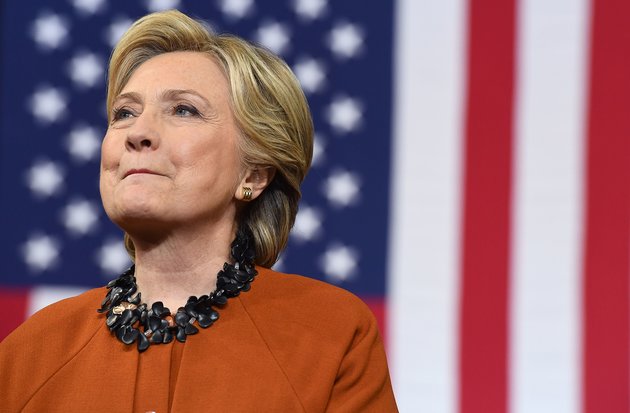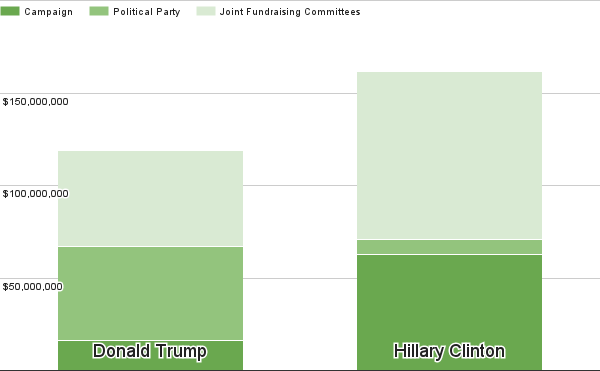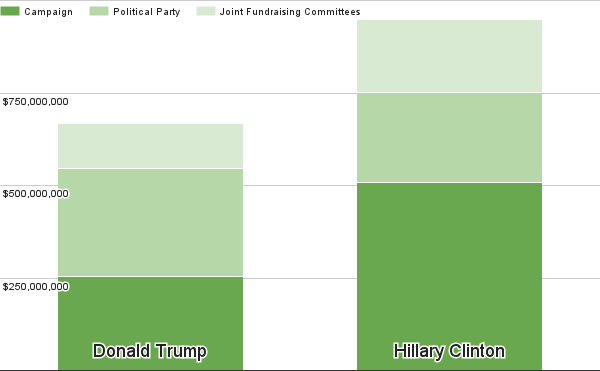
WASHINGTON ― Hillary Clinton and her allied Democratic committees headed into the final weeks of the presidential campaign with a massive $162 million cash pile, dwarfing the total held by Republican Donald Trump and his allies by more than $40 million.
But the biggest problem for Trump appears to be where his cash is stashed.
Overall, Trump and his supposedly allied committees had $119 million cash on hand as of Oct. 20. But less than half is controlled or headed to committees under Trump’s direction.
Trump’s campaign had just $16 million cash on hand. Meanwhile, the Republican National Committee is sitting on $51 million. The two joint fundraising committees raising money for Trump also had $52 million in the bank at that same time. It’s unclear, however, how much of that money will be transferred to the Trump campaign, and how much will be spent on further fundraising expenses.

Trump’s precarious cash situation is nothing new for his campaign. He has run far behind Clinton in the amount of money raised and spent for the entire 2016 election cycle.
Overall, Clinton has raised $509 million for her campaign ― double Trump’s $255 million. When combining candidate fundraising with their central party committees and their joint fundraising committees, Team Clinton has raised $947 million, compared with Team Trump’s $669 million.
Clinton has used her huge fundraising advantage to deluge the airwaves with ads and build a massive field organization that is swamping Trump and Republicans in states that allow early voting.
Democrats have already improved their position from 2008 and 2012 in terms of absentee and early votes in numerous battleground states, according to CNN. As of Oct. 18, Clinton was surpassing Trump in advertising by a 3-to-1 margin, according to the Wesleyan Media Project. Pro-Clinton outside groups, like her record-setting super PAC, continue to air more ads than pro-Trump groups.
On outside group spending, it’s notable that the RNC is nowhere to be seen. The main Republican Party committee has spent only $321,531 on independent expenditures against Clinton, and, even more surprisingly, only $60,506 on coordinated party expenditures. Coordinated party expenditures allow the party to share the burden of some candidate advertising costs. In 2016, parties are allowed to spend a maximum of $23.8 million on these coordinated expenses with their presidential candidate. The RNC has spent basically nothing.
In 2012, the RNC spent the maximum allowed on coordinated expenditures to support Mitt Romney. The party dropped an additional $42 million on independent expenditures to boost Romney and attack President Barack Obama.
The RNC had $51 million cash on hand on Oct. 20, and had spent less than $400,000 on either coordinated or independent expenditures to support their 2016 candidate. Most of those expenses were incurred more than a year ago ― before Republican voters chose Trump as their standard-bearer.
The Democratic National Committee has spent little on either coordinated or independent expenditures, but it hasn’t had to. Clinton’s campaign has always maintained a massive cash, advertising and organizational advantage over Trump, and she has rarely trailed in public polling. Further, Trump’s propensity to routinely put both feet in his mouth made it possible for the DNC to spend its money in other ways ― or, perhaps for the first time in years, end the campaign in the black.

